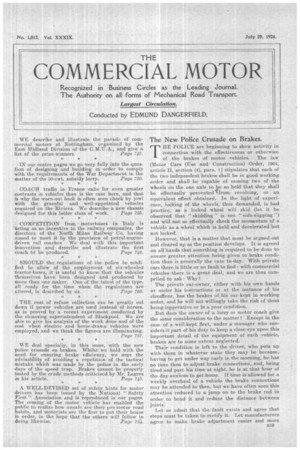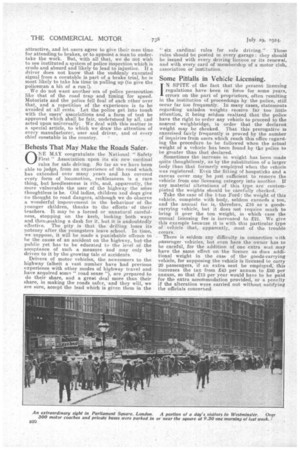The New Police Crusade on Brakes.
Page 1

Page 2

If you've noticed an error in this article please click here to report it so we can fix it.
THE POLICE are beginning to show activity in connection with the effectiveness or otherwise of the brakes of motor vehicles. The law l_Motor Cars (Use and Construction) Order, 1904, article II, section (4), para. 1] stipulates that each of the two independent brakes shall be in good working order and shall be capable of causing two of the wheels on the one axle to be so held that they shall be effectually preventedffrom revolving, or an equivalent effect obtained. In the light of experience, locking of the wheels, thus demanded, is bad practice, as a locked wheel will skid (let it be observed that " skidding " is not " side.slipping ") and will not so effectually check the momentum of a vehicle as a wheel which is held and decelerated but not locked.
However, that is a matter that must be argued out and cleared up as the position develops. It is agreed on all hands that something is required to be done to .ensure greater attention being given to brake condition than is generally the case to-day. With private cars there is little or no fault to find : with commercial vehicles• there is a great deal, and we are thus compelled to ask: Why?
The private car-owner, either with his own hands or under his instructions or at the instance of his chauffeur, has the brakes of his car kept in working order, and he will not willingly take the risk of them being inpperative or in a poor condition.
But does the owner of a lorry or motor coach give the same consideration to the matter ? Except in the case of a well-kept fleet, under a manager who considers it part of his duty to keep a close eye upon this important detail of the equipment of each vehicle, brakes are to some extent neglected.
Their condition is left to the driver, who puts up with them in whatever state they may be because, having to get under way early in the morning, he. has no time then to adjust brake connections, and, being tired and past his time at night, he is at that hour of the day anxious to get home. If time is allowed for a weekly overhaul of a vehicle the brake connections may be attended to then, but we have often seen this attention reduced to a jump on to the brake rod in order to bend it and reduce the distance between joints.
Let us admit that the fault exists and agree that steps must be taken to rectify it. Let manufacturers agree to make brake adjustment easier and more attractive, and let users agree to give their men time for attending to brakes, or to appoint a Man to undertake the work. But, with all that, we do not wieh to see instituted a system of police inspection which is erode and absurd and likely to lead to injustice. If a driver does not know that the suddenly executed signal from a constable is part of a brake trial, he is most likely to take his time in pulling up (to give the policeman a bit of a run I).
We do not want another era of police persecution like that of the road trap and timing for speed. Motorists and the police fell foul of each ether over that, and a repetition of the experience is to be avoided at all costs. Let the police get into touch with the users' associations and a form of test be approved which shall be fair, understood by all, end acted upon universally. We deal with this matter in a special article, to which we draw the attention of every manufacturer, user and driver, and of every chief constable in the country.
Behests That May Make the Roads Safer.
0 • NE MAY congratulate the National " Safety First " Association upon its six new cardinal rules for safe driving. So far as we have been able to judge, from an experience of the road which has extended over many years and has covered every form of locomotion, recklessness 7 s a rare thing, but heedlessness is rife, and, apparently, the more vulnerable the user of the highway the more thoughtless is he. Old ladies, children and dogs give no thought to road dangers, although we do observe a wonderful improvement in the behaviour of the younger children, thanks to the efforts . of their teachers. It may he a forced or unnatural carefulness, stopping on the kerb, looking both ways and then,anaking a dash for it, but it is undoubtedly effective. The pity is that the drilling loses its potency after the youngsters leave school. In time, we suppose, it will be made a punishable offence to be the cause of an accident on the highway, but the public yet has to be educated to the level of. the acceptance of such a measure and may only be driven to it by the growing tale of accidents.
_Drivers of motor vehicles, the newcomers to the highway (albeit a vast number have had previous experience with other modes of highway travel and have acquired some " road sense "), are prepared to do their share, and a great deal more than their share, in making the roads safer, and they will, we are sure, accept the lead which is given them in the " six caret' ina.l rules for safe driving." Those rules should be posted in every garage : they should be issued with every driving licence or its renewal, and with every card of membership of a motor club, association or institution.
Some Pitfalls in Vehicle Licensing.
IN SPITE of the fact that the present licensing regulations have been in force for some years, errors on the part of proprietors, often resulting in the institution of proceedings by the police, still occur far too frequently. In many cases, statements regarding unladen weights receive far too little attention, it being seldom realized that the police have the right to order any vehicle to proceed to the nearest weighbridge, in order that the declared. weight may be checked. That this prerogative is exercised fairly frequently is proved by the number of inquiries from users which reach this office regarding the procedure to be followed when the actual weight of a vehicle has been found by the police to be greater than that declared.
Sometimes the increase in weight has been made quite thoughtlessly, as by the substitution of a larger body than that formerly employed when the vehicle was registered. Even the fitting of hoopstieks and a canvas cover may be just sufficient to remove the vehicle from one licensing category into another. If any material alterations of this type are contemplated the weights should be carefully checked. ' Take the case of the 1-ton Ford: the weight of this vehicle, complete with body, seldom exceeds a ton, and the annual fee is, therefore, 1.:16 as a goodscarrying vehicle, but it does not require much to bring it over the ton weight, in which case the annual licensing fee is increased to 221. We give this example because it is with this particular type of vehicle that, apparently, most of the trouble c mins. . . There is seldom any difficulty in connection with passenger vehicles, but even here the owner has to be careful, for the addition of one extra seat may have the same effect on the licence as does additional weight in the case of the goods-carrying vehicle, for supposing the vehicle is licensed to carry 20 passengers, if an extra seat be employed; this increases the tax from £43 per annum to £60 per annum, so that £15 per year would have to be paid for the extra accommodation provided, or a penalty if the alteration were carried out without notifying the officials concerned,






























